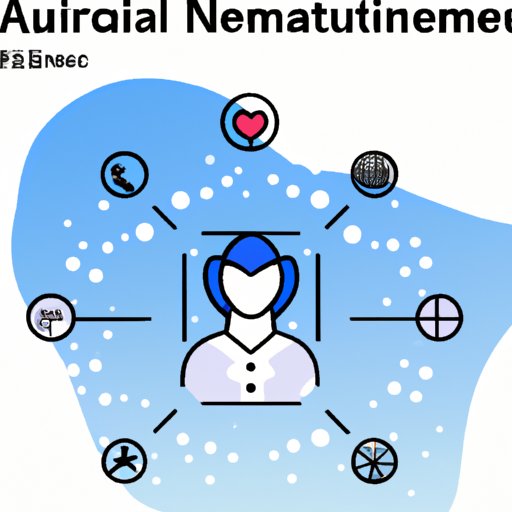Introduction
Artificial intelligence (AI) is a rapidly developing technology that has the potential to revolutionize many aspects of human life. AI is defined as “the ability of a computer or machine to think and learn” and includes technologies such as machine learning, natural language processing, and robotics. In this article, we will explore the various ways in which AI can benefit humans, from improved diagnosis and treatment of diseases to increased safety in the workplace.
Improved Diagnosis and Treatment of Diseases
The use of AI in medical diagnostics has become increasingly widespread in recent years. AI-enabled systems can process large amounts of data more quickly and accurately than humans, allowing for faster and more accurate diagnoses. For example, a study conducted by researchers at the University of Nottingham found that an AI algorithm was able to detect breast cancer with greater accuracy than human radiologists.
AI-assisted treatment options are also becoming increasingly available. For example, AI-powered robots are being used to assist with minimally invasive surgeries, such as laparoscopic procedures, which require precise movements and detailed visualization of the surgical site. AI-assisted robotic surgery has been found to reduce patient recovery time, improve surgical precision, and reduce the risk of complications.
Automation of Repetitive Tasks
AI can be used to automate mundane and repetitive tasks, freeing up valuable time and resources. AI-driven automation can streamline business processes, allowing companies to focus on more important tasks. For example, AI-powered chatbots can be used to answer customer inquiries and provide basic customer service, reducing the need for human customer service agents.
AI-driven automation can also increase productivity. AI-enabled robots can be used to automate production lines, allowing companies to produce goods more efficiently. Additionally, AI-powered algorithms can be used to optimize logistics processes, such as supply chain management, resulting in reduced costs and improved delivery times.
Improved Access to Education
AI can be used to improve access to education, particularly for those who have limited access to traditional educational institutions. AI-enabled online learning platforms can provide personalized and engaging learning experiences, allowing students to learn at their own pace and in their own space. AI-powered tutoring systems can also be used to provide personalized instruction and guidance to students, allowing them to better understand difficult concepts.
AI-enabled learning platforms can also provide real-time feedback to students and instructors, allowing them to track progress and adjust their teaching methods accordingly. Additionally, AI-driven assessment tools can be used to evaluate student performance, allowing instructors to identify areas of improvement and provide targeted instruction.

Increased Safety in the Workplace
AI can be used to automate safety procedures, such as accident prevention and emergency response protocols. AI-enabled systems can monitor working conditions and alert personnel in the event of any hazardous situations. Additionally, AI-powered robots can be used to perform dangerous tasks, such as handling hazardous materials, which would otherwise be performed by human workers.
AI-enabled systems can also be used to enhance surveillance and security systems, allowing for improved monitoring of working conditions. For example, AI-powered facial recognition systems can be used to identify potential threats and alert personnel in the event of suspicious activity.

Enhanced Personalization of Products and Services
AI can be used to enhance personalization of products and services, allowing companies to better meet the needs of their customers. AI-powered predictive analytics can be used to anticipate customer needs and preferences, allowing companies to tailor products and services to the individual. For example, AI-enabled recommendation systems can be used to suggest products and services based on previous purchases and search history.
AI-enabled personalization can also be used to create more engaging shopping experiences. AI-powered chatbots can be used to provide personalized customer service, allowing customers to ask questions and receive tailored advice. Additionally, AI-enabled virtual assistants can be used to provide product recommendations and discounts, allowing customers to find the best deals.
Conclusion
In conclusion, artificial intelligence has the potential to revolutionize many aspects of human life, from improved diagnosis and treatment of diseases to enhanced personalization of products and services. AI can be used to automate mundane and repetitive tasks, freeing up valuable time and resources. It can also be used to improve access to education, increase safety in the workplace, and create more engaging shopping experiences. As AI technology continues to develop, the possibilities for its applications are endless.
(Note: Is this article not meeting your expectations? Do you have knowledge or insights to share? Unlock new opportunities and expand your reach by joining our authors team. Click Registration to join us and share your expertise with our readers.)
